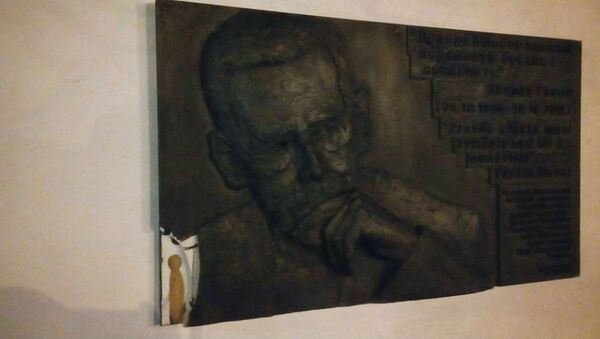It should be noted that the Vaclav Havel Boulevard was previously known as Ivan Lepse Boulevard, named after a Soviet revolutionary, and was renamed as part of the ongoing de-communization campaign in Ukraine.
However, political analyst and civic activist Jan Miklas told Sputnik Ceska Republika that while some might try to claim that this act of vandalism was orchestrated by Moscow, he believes that the vandals had different motives.
"There are two possibilities: it is either a simple act of vandalism or a protest by part of the Ukrainian society against government policy. The memorial plaque was installed by government or groups affiliated with it, by people who believe that the European vector of development is the only option for Ukraine. However, a considerable part of Ukrainian society opposes this point of view. Therefore, I consider this act of vandalism in the Ukrainian capital not as a protest against the specific president of the democratic Czech Republic – it's more likely that someone used this act to declare his disagreement with the process of Ukraine’s integration with the EU, a process personified (according to the vandals) by Vaclav Havel," he explained.
According to Miklas, people in Ukraine have to resort to such extreme measures because they apparently have no other way to openly express their opinion as government crackdowns against opposition rallies became increasingly common in the country.
"After conversing with Ukrainians I discovered that people there are afraid of criticizing Poroshenko’s policies and the blatant Russophobia that has become something of a mass obsession in the country," he added.
As Miklas pointed out, the demolishing and defacing of monuments related to Russian and Soviet history has become common in Ukraine. However, this trend may well lead the younger generation of Ukrainians to believe that smashing a memorial plaque to bits is the norm.
"Fortunately, the Czech Republic no longer suffers from such ‘teething problems’, so no one would think of destroying the monument to Taras Shevchenko on Kinskych street in Praha 5 district in retaliation for the actions of vandals in Kiev," the analyst surmised.



